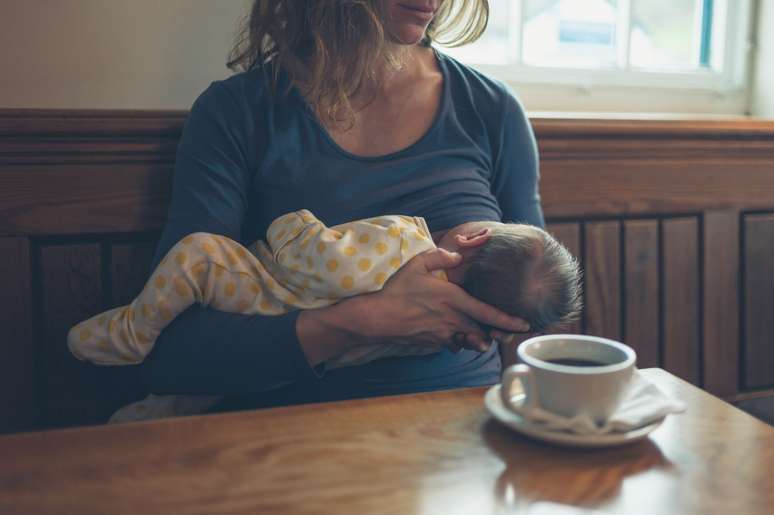According to experts, the drink can also remain in the pregnant woman’s menu, provided that it is in small quantities. Understand!
There are several benefits of coffee: it is a stimulating drink, which helps to improve mental alertness and body energy. “Caffeine increases concentration and attention, helping us to tackle difficult tasks. It also encourages the release of neurotransmitters, such as dopamine and serotonin, which improve mood and give people a sense of well-being,” explains Paula Pires, endocrinologist and metabolologist of the Brazilian Society of Endocrinology and Metabology (SBEM).
html[data-range=”xlarge”] figure image img.img-c1e7683f20506454adeeb8cc832d551evxxduy82 { width: 774px; height: 438px; }HTML[data-range=”large”] figure image img.img-c1e7683f20506454adeeb8cc832d551evxxduy82 { width: 548px; height: 310px; }HTML[data-range=”small”] figure figure img.img-c1e7683f20506454adeeb8cc832d551evxxduy82, html[data-range=”medium”] figure image img.img-c1e7683f20506454adeeb8cc832d551evxxduy82 { width: 564px; height: 319px; }
doses of up to 250 milligrams per day are associated with the due benefits, bringing the feeling of pleasure, euphoria, improvement of physical activities and even symptoms of despondency and sadness. However, above 500 milligrams per day, the effect is the opposite. “It can cause tension, increase anxiety, insomnia, nervousness and lead to nausea,” warns Lisa Afonso, clinical and sports nutritionist, specialist in Metabolism, Sports Nutrition and Weight Loss and Exercise Physiology from FMRP-USP and in Women’s Health by Gama Filho.
Therefore, the recommendation of the World Health Organization (WHO) is this healthy adults consume no more than 400 milligrams of caffeine per day – about 4-5 cups of coffee. The exception goes to children and pregnant women, who should further limit their intake.
Can pregnant women drink coffee?
YES. It is permissible to drink coffee during pregnancy, as long as it is in small quantities. Up to 200 milligrams of caffeine a day, about three cups, is considered safe in pregnancy. “With that amount, there doesn’t seem to be a convincing association between caffeine and fertility problems or harm to the fetus,” said Igor Padovesi, a gynecologist at the University of São Paulo (USP) and Albert Einstein Hospital.

The dangers of too much coffee during pregnancy
Just as high doses of caffeine can trigger anxiety, tremors, increased heart rate and insomnia in healthy adults, consuming more than 200 milligrams per day during pregnancy impairs blood flow to the placenta.
The substance and its metabolites (waste products left over from metabolism in the body), easily cross the placental barrier and they can be found in significant quantities in the amniotic fluid and blood of the baby. “This is associated with a change in the baby’s heart rate, increased respiratory activity, and inconsistent effects on fetal blood flow and to the placenta,” says Igor. Therefore, it increases the risk of pregnancy loss in the first trimester and birth of a baby with a low birth weight, says Lisa.
Be careful with caffeine
There are other drinks and foods that also contain caffeine that pregnant women should be aware of. ” They have slightly different metabolisms, but basically what works is the same substance. Coffee is a drink with a faster onset of action and its effect lasts up to 2 hours. Guarana powder, for example, has a slightly slower activity, lasting up to 6 hours,” explains Carlos Moraes, gynecologist and obstetrician of Santa Casa and member of Febrasgo (Brazilian Federation of Gynecology and Obstetrics Associations).
Black tea, green tea, cocoa, chocolates, sodas, some medicines and energy drinks they are other products that contain a certain amount of caffeine and should be used in strict order.
Is it possible to replace the coffee?
Most women who have a habit of drinking coffee are not able to replace it so easily with another drink. “Ideally, decrease the amount gradually, thus avoiding a big shock to the body”Paula says. Drinking more water and eating caffeine-rich foods (in moderation) like dark chocolate can help satisfy the craving in the process.
Herbal teas that do not contain caffeine are also good, such as chamomile, fennel, lemon balm and mint, as well as fresh fruit-based juices, to be mixed with infusions.
Source: Terra
Ben Stock is a lifestyle journalist and author at Gossipify. He writes about topics such as health, wellness, travel, food and home decor. He provides practical advice and inspiration to improve well-being, keeps readers up to date with latest lifestyle news and trends, known for his engaging writing style, in-depth analysis and unique perspectives.





![TOMORROW BELONGS TO US IN ADVANCE: THE PHILIPPINES WILL DO EVERYTHING TO PROTECT CHARLES… WHAT’S AHEAD OCTOBER 27 TO OCTOBER 31, 2025 [SPOILERS] TOMORROW BELONGS TO US IN ADVANCE: THE PHILIPPINES WILL DO EVERYTHING TO PROTECT CHARLES… WHAT’S AHEAD OCTOBER 27 TO OCTOBER 31, 2025 [SPOILERS]](https://fr.web.img6.acsta.net/img/b2/7f/b27f5a3fbc55d29b821eff36e2cd8a48.jpg)


